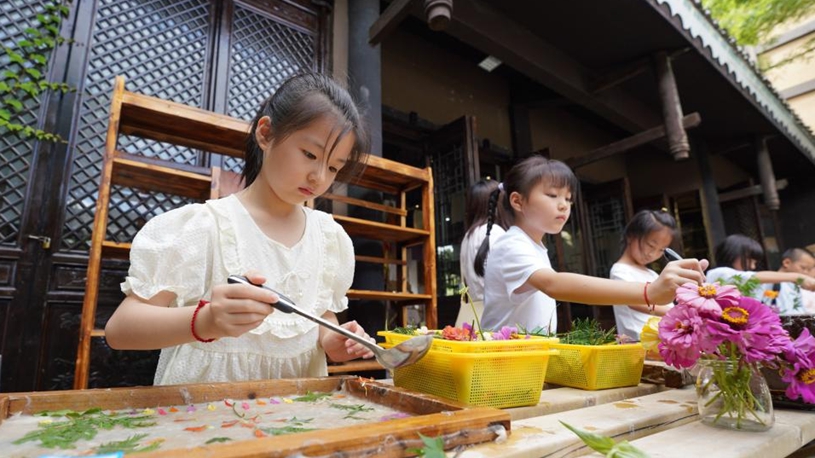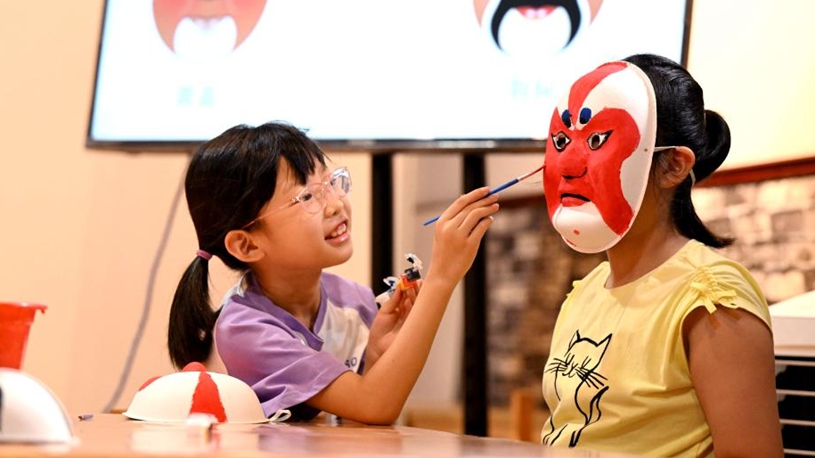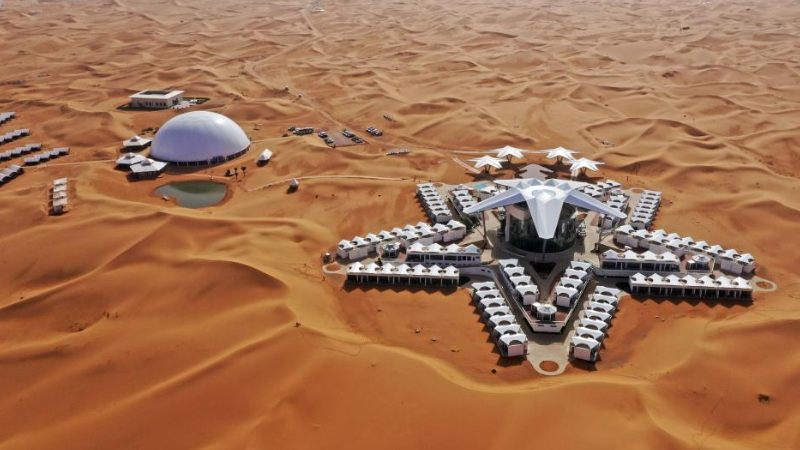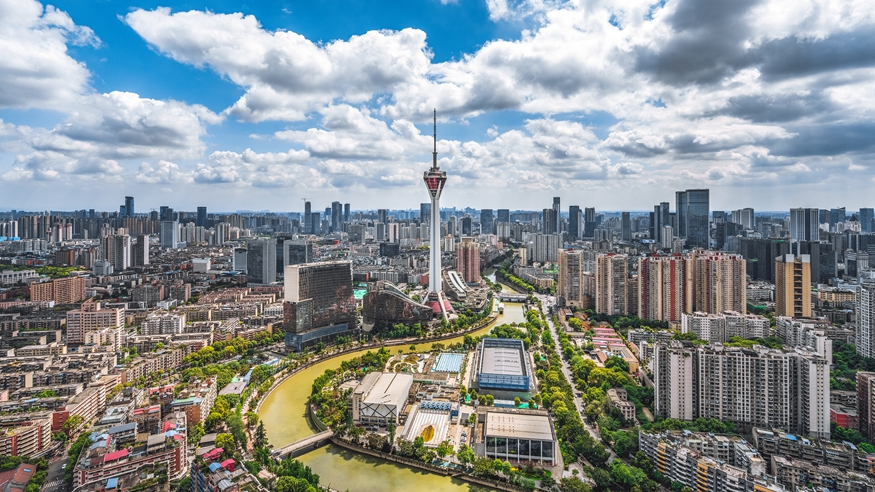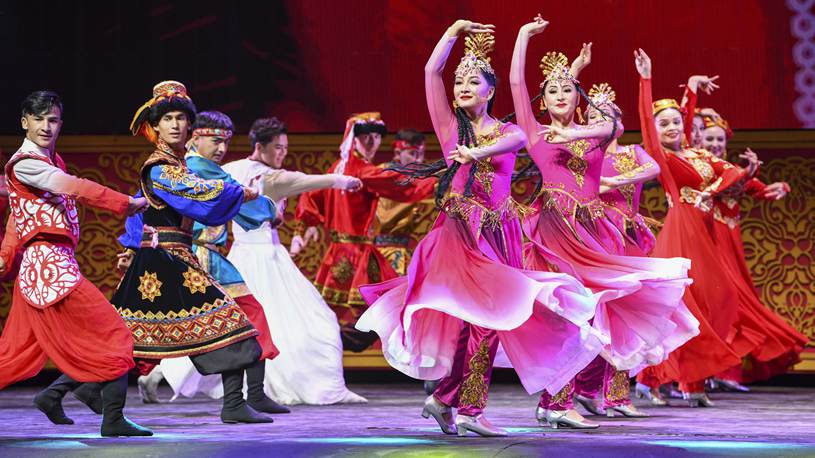* Despite ongoing heatwaves, China's tourism market is heating up during this summer. And beer festivals in a number of Chinese cities are attracting huge crowds.
* The beer festivals are giving a further boost to consumption -- a major driver of China's economy -- as tourists spend lavishly during summer vacations.
* Consumption in the catering and tourism sectors has surpassed pre-pandemic levels, and consumption's contribution to economic growth reached 77.2 percent for the first six months of the year.
QINGDAO, July 22 (Xinhua) -- Despite ongoing heatwaves, China's tourism market is heating up during the first summer since the country lifted its COVID-19 control measures. And beer festivals in a number of Chinese cities are attracting huge crowds.
As travel restrictions have been lifted, many more people are traveling this summer and visiting beer festivals in cities like Qingdao, Dalian and Harbin.

Visitors watch a fireworks show at the 21st China Harbin International Beer Festival in Harbin, capital of northeast China's Heilongjiang Province, July 20, 2023. (Xinhua/Zhang Tao)
These beer events are adding further momentum to China's busy summer travel market as well as consumer consumption as the world's second-largest economy recovers from the pandemic.
BEER FESTIVALS
In the summer, tourists escape the heat and flock to coastal cities like Qingdao and Dalian, and to cities like Harbin in the country's northeast. The local beer festivals add further appeal to these popular destinations.
The Harbin International Beer Festival opened on Thursday in Harbin, the capital of northeast China's Heilongjiang Province, offering more than 500 varieties of beer from over 30 brands. Visitors can also enjoy music performances and themed parades.
On July 14, the Qingdao International Beer Festival kicked off in the coastal city of Qingdao in east China's Shandong Province, showcasing more than 2,000 varieties of beer from over 40 countries and regions -- a record high number.
Inaugurated in 1991, Qingdao's beer festival has grown into the largest and most influential beer event in China, and it is now one of four major beer festivals in the world.
It has also become a carnival of sorts for all tourists visiting from domestic and international locations. The event features over 300 activities, including music performances, art shows, sports events, beer-drinking competitions and beer culture fashion shows.
The festival will run for 24 days in the home city of the renowned Tsingtao Brewery and is expected to attract over 5 million visitors this year, more than tripling last year's figure.

Fireworks illuminate the sky during the opening ceremony of the 33rd Qingdao International Beer Festival in Qingdao, east China's Shandong Province, July 14, 2023. (Xinhua/Li Ziheng)
"Beer is a universal language, and festivals are human rituals of empathy. The combination of these two things is the most important factor in the success of the Qingdao International Beer Festival," said Lin Xingyu, one of the festival's senior consultants.
Micheal Bhatti, an international student from Australia, was in the crowd at the Qingdao beer festival, intently studying the drinks list at the entrance to a beer tent.
"This is my first time at the beer festival. I like to taste different kinds of beers and the activities they arrange," Bhatti said. Qingdao is an open and inclusive city, he observed, and he often receives friendly gestures from locals.
CONSUMPTION BOOST
The beer festivals are giving a further boost to consumption -- a major driver of China's economy -- as tourists spend lavishly during summer vacations.
During a seafood and beer festival in Qingdao, a vendor surnamed Ye is selling a great variety of fresh seafood, including clams, sea snails, oysters and tongue fish.
"At around 3 a.m. every day, the fishing vessels bring back the freshest seafood at affordable prices. My business is not only about making money, but about promoting our seafood to more people," Ye said.
Wang Chong is busy entertaining guests in his store on Dengzhou Road, a beer street in Qingdao. He operates three specialty product stores, selling beer ice cream, beer fruit tea and beer bread.

Customers drink beer at a night market in Qingdao, east China's Shandong Province, July 14, 2023. (Xinhua/Li Ziheng)
"Since June, our three stores have received an average of over 1,500 customers per day. Beer has become a part of daily life," Wang said. "To my surprise, our goods attract many foreign visitors. They know a lot about Tsingtao beer, and are willing to try its products."
This year, China's economy is seeing a robust recovery with consumer consumption regaining momentum. In the first half of 2023, China's gross domestic product expanded 5.5 percent year on year and its retail sales of consumer goods grew 8.2 percent, 8.9 percentage points higher than a year ago, according to the National Bureau of Statistics.
Consumption in the catering and tourism sectors has surpassed pre-pandemic levels, and consumption's contribution to economic growth reached 77.2 percent for the first six months of the year, said Jin Xiandong, an official of the National Development and Reform Commission.
Many types of consumption activities, including shopping festivals, markets and sales promotion activities, are being held concurrently with the beer festivals, said Wang Zhongwu, a professor at Shandong University. "They can give a strong boost to summer tourism and the night economy, and help accelerate the country's post-pandemic economic recovery."
Dai Bin, president of the China Tourism Academy, said that all popular tourist destinations, new or old, are doing everything possible to attract tourists with products deeply integrated with culture.
"Holiday consumption continues to be refreshed, fitting the trend of Chinese residents' consumption upgrade," said Wang Yun, a researcher at the Academy of Macroeconomic Research. "Further efforts should be made on the supply side to provide more high-quality goods and services, promoting the continued recovery and expansion of consumption."
(Video reporter: Zhao Xiaoyu, Zhu Xiaoguang, Wang Houyuan; Video editors: Hu Yousong, Zheng Qingbin, Yang Zhixiang and Liu Yutian) ■



